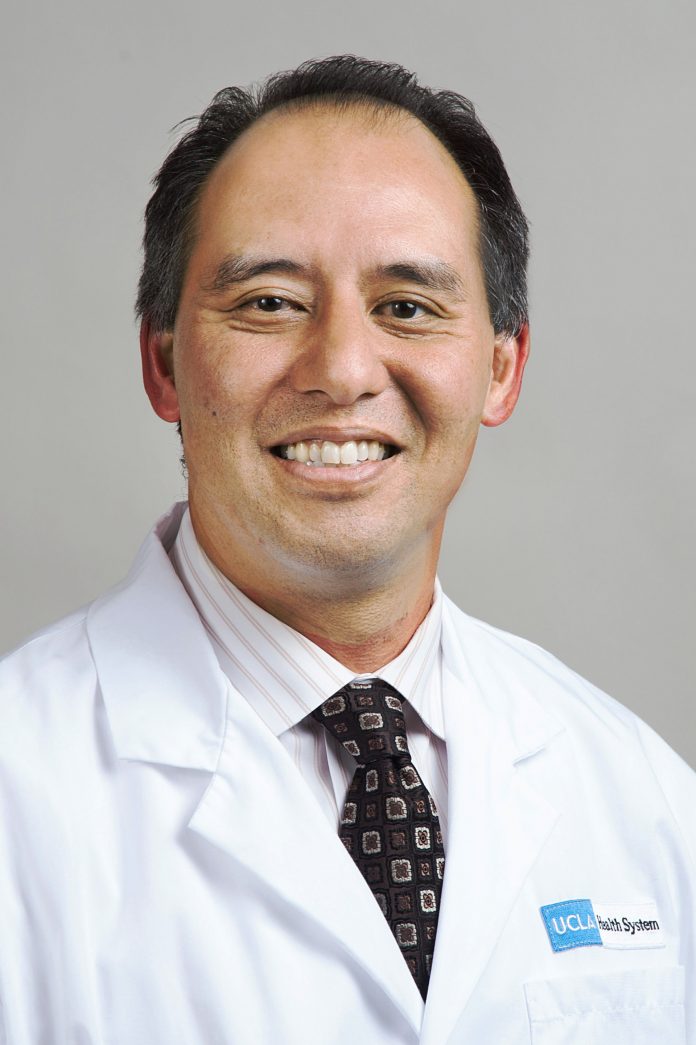CC resident Dr. Christopher Giza is as an accomplished neurologist,
which has taken him to different corners of the world to treat patients
By Christian May-Suzuki
“A farm in West Virginia” is not the first place that comes to mind when guessing the upbringing of an accomplished neuroscientist, but that is an accurate picture of Dr. Christopher Giza humble beginnings.
But it wasn’t the stereotypical farm life with cows, chickens, and horses. His parents were both organic chemists, and they encouraged Giza to go into medicine. He eventually attended medical school, where he discovered that he was fascinated with the human brain and its internal workings.
While attending Dartmouth College, he contemplated how best he could help people — and kept returning to one particular interest.
“I really love working with kids, so a sub-specialization in pediatric neurology was natural,” Giza said.
He eventually made a decision that would inset the course of his life: he chose to specialize in traumatic brain injuries (TBIs). Giza went to his hometown college, West Virginia University for his M.D., before completing his neurology training at UCLA
At first, the doctor spent a lot of time in the intensive care unit (ICU), working with kids who suffered from severe TBIs.
“Concussion patients didn’t come to neurology clinics very often,” Giza recalled.
After his pediatric neurology fellowship, Giza spent two summers working with Yosemite Search and Rescue, after which he returned to UCLA to study neurotrauma.
He remained in the lab doing research for three years before slowly reintegrating himself into the hospital and clinic.
“The public health data showing that TBI was a major, worldwide cause of death and disability prompted me to return to [the lab],” Giza explained.
According to the World Health Organization, TBIs will likely be one of the top three causes of worldwide disability by 2020. It is the primary cause of acquired disability in people younger than age 40, in addition to the many seniors and older individuals who suffer from head injuries as a result of falls or other trauma.
This caused something of an awakening in the medical field, according to medical officials.
“In terms of mild TBI and concussion – these injuries were largely ignored in the past, but now we are focusing on them again, particularly in the setting of sports concussions, recreational accidents, and military service,” he said.
Dr. Giza has a unique experience in all three of the aforementioned areas. He also served as a civilian advisor to the U.S. Military, traveling to Afghanistan in 2011.
“I was working at UCLA and had Adm. Michael Mullen (chairman of the Joint Chiefs of Staff, visit our UCLA Brain Injury Research Center),” Giza recalled. “He decided he wanted to embed some civilian experts with the clinical TBI teams in Afghanistan, to help learn from our experience with athletes and kids with concussions [and other TBIs].“
“About one month after our meeting, his medical chief of staff, Col. Christian Macedonia, called and told me I was selected to be one of three civilian advisors chosen to go into the theater with Grey Team III. After talking about it with my wife Rosanne, we both agreed that it was such an important thing, that I must go!”
Dr. Giza founded and directs the UCLA Steven Tisch BrainSPORT program, which focuses on providing cutting edge technology and care for athletes dealing with concussions and other head injuries.
Giza has also served as a clinical consultant for a majority of the major American professional sports leagues, including the NFL, NHL/NHLPA, NBA, MLB and Major League Soccer. He says that it has been a rewarding experience in its own right, despite some key differences in how they operate.
“There are many different factors that weigh into their policies – athlete health, financial, legal, ethical,” Giza noted. “What has been most rewarding is to work with professional athletes, most of whom show tremendous discipline and dedication to their training and have legitimate questions and concerns about their brain health.”
Dr. Giza currently serves as a professor of Pediatric Neurology and Neurosurgery at the David Geffen School of Medicine and UCLA Mattel Children’s Hospital. His current research focuses on translational aspects of pediatric TBI, including post-traumatic epilepsy, anxiety, and cognition, with emphasis on the effects of physical activity and environment.
He also remains active in the Culver City community and recently led the monthly “Walk with a Doc” event.
“Our family loves living in Culver City – we have lots of friends here,” Giza remarked. “We can get around on foot or on a bike (and appreciate as the city becomes more bike friendly in the future), enjoy the local parks, great restaurants and all the fun things to do.”

